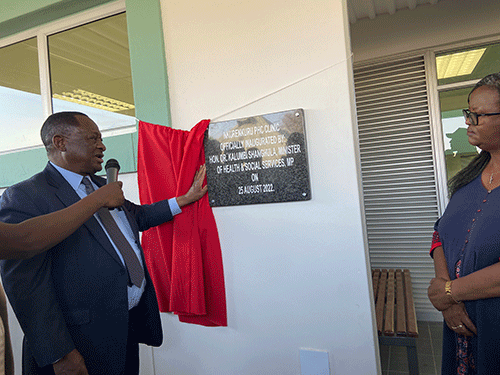NKURENKURU – The Nkurenkuru Primary Health Care clinic was last Wednesday officially inaugurated after opening its doors to the public in June as the community waited for nine years for it to open. Various factors conspired to delay the clinic’s establishment and opening, including poor workmanship as well as the pressing economic situation which affected the health ministry’s budget.
According to health minister Dr Kalumbi Shangula, the Nkurenkuru PHC clinic was planned as the first phase component of the envisaged Nkurenkuru District Hospital, which is yet to be constructed. This clinic is the first government-funded clinic to be constructed in Nkurenkuru.
“It is a state-of-the-art facility which once it is fully operational will offer the screening, monitoring and treatment of common illnesses, growth monitoring and promotion,” he noted.
The clinic will also offer expanded programmes on immunisation (EPI) as well as antenatal and post-natal care, family planning services and dental services.
The clinic likewise boasts an Anti-Retroviral Therapy (ART) section, which will provide the community with voluntary counselling and testing services. The section also hosts an adolescent-friendly room with its own private entrance.
“Thus, young people are encouraged to make use of the facility to receive the needed services in complete privacy,” Shangula stated.
A staff structure of 41 positions for the clinic has been approved. There will be two medical officers, 15 registered nurses, 10 enrolled nurses, one pharmacist and three pharmacist assistants. There will also be support staff. The completion of this project is part of the government’s effort to improve the delivery of healthcare services in all regions of the country.
While inaugurating the Nkurenkuru PHC, the minister also commissioned the oxygen-generating plant, which was a donation to the Nkurenkuru Infectious Unit located at the Nkurenkuru Primary Health Care Clinic. The Welsh government, through the partnership between the University of Namibia and the Cardiff University, donated the oxygen tanks and oxygen- generating plants to the Ministry of Health and Social Services to enable the ministry to build capacity to respond effectively to the Covid-19 pandemic and any other disease of public concern.
“The two facilities are now in the hands of the community. Let’s make use of the services available at the facilities to improve the quality of life of the residents of this town and this region. Let us not vandalise or damage in any way these valuable assets. Please report any acts of vandalism or theft of state assets to the relevant authorities,” the minister urged.
“I thank our development cooperation partners who responded to our call to support the efforts to improve the availability of medical oxygen at our health facilities,” Shangula noted. On Wednesday, before inaugurating the Nkurenkuru PHC, the minister also commissioned an oxygen- generating plant at the Rundu Intermediate State Hospital, which was donated by USAID through the Centres for Disease Control and Prevention (CDC) Namibia.
“It is true that complex problems, such as dealing with the Covid-19 pandemic, do not render themselves to straightforward or simple solutions. They require the collaborative efforts supported by individuals, organisations and nations. It is through such collaborations that we are here today with one of our collaborative partners, namely the CDC Namibia,” Shangula observed.
“The need for this plant was identified when the world, and Namibia, was hit by the worst of Covid pandemic waves. As you all know too well, people can get very sick from Covid, with many sick enough to be hospitalised and needing breathing support and extra oxygen. A patient who is very ill from a Covid infection will often need a concentrated supply of oxygen for days or weeks to overcome the damage that the virus had done to the lungs,” said CDC Namibia director Dr Brian Baker at the handover of the Rundu oxygen- generating plant.
“This plant has two 500-litre tanks. This will meet not only the needs of Rundu Hospital, but also allow for the ability to fill tanks to be brought to other health facilities. Therefore, this donation from CDC provides not just for the needs of future seriously-ill Covid-19 patients, but will also provide oxygen for patients suffering from many other diseases”, he added.
In the past few weeks, the minister inaugurated a number of new healthcare facilities, such as the out- patient department and infectious disease facility at the Okahao District Hospital, a maternity waiting shelter at Outapi, and oxygen-generating plants and bulks tanks at Katima Mulilo, Gobabis, Mariental and other towns. Shangula believes that the developments have significantly expanded access and strengthened government’s capacity to serve the communities better.


